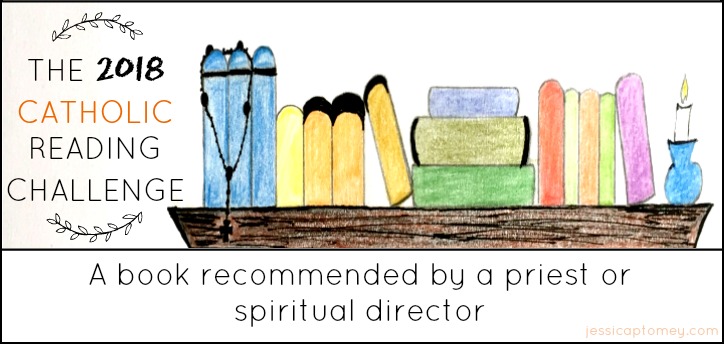Summer is speeding by! So is the time left to get through some picks for the 2018 Catholic Reading Challenge. I am continuing to share what I am reading for the challenge with you. Do you love conversion stories? Me too!

Category: “A book recommended by a priest or spiritual director”
My Pick: An Immoveable Feast: How I Gave Up Spirituality for a Life of Religious Abundance by Tyler Blanski
Our dear friend (and godfather to our son Sam), Fr. Matt, is often sending us books or records in the mail. I know, awesome, right? When this one arrived on our doorstep a couple of months, I was really excited. Not only had I heard good things about it already, but I also LOVE conversion stories of how people discovered God’s call to come into the Catholic Church. I can’t put them down once I start. This was the case with both Scott and Kimberly Hahn’s Rome Sweet Home and Jennifer Fulwiler’s Something Other Than God.
Every conversion story is unique and quite shaped by the author’s own personal narrative and spiritual journey. What is particularly compelling about Blanski’s story is that he was in seminary to become an Anglican priest when he came into the Catholic Church. In fact, he was only a few months away from ordination when he finally conceded that Catholicism was the truth, and must therefore be his and his family’s home. It was not at all a convenient conclusion or easy decision. He and his wife were about to welcome their first child and in the process of planting an Anglican Church, for which they had been fundraising. They had major skin in the game. His livelihood was literally on the line. Obeying the Holy Spirit and walking out what he had come to realize was true meant surrendering the life he had planned to live.
But his account demonstrates how, despite the difficulties, he really had no other choice. He found himself at a critical crossroad, after living a type of faith that he ultimately found to be short of the fullness of the Gospel. As a millennial, growing up in a baptist church and youth group, he had an emotive early faith experience that developed into a fairly consumeristic, personal spirituality. As he describes it, he had Jesus — he didn’t think he needed religion or the church to facilitate that relationship. He was actually drawn mostly to the aesthetic of Anglicanism originally, finding it comfortable to take the tradition and liturgy and still rely mostly on his own personal interpretations of all but the most basic theological tenets. He puts it this way:
“Growing up, I thought the good news was that I could have a personal relationship with Jesus–without religion. I wanted the King but not the Kingdom, the head but not the body, the vine but not the branches, a culture but not the cult. But like the Incarnation of Christ himself, the Church is a historic fact. She is the social continuity of the Incarnation” (p. 262).
This is a conversion story with a lot of theological meat on it’s bones, as Blanski shares Scripture passages and insights from his personal study to illustrate the progression of his spiritual journey. I think that he also gives an poignantly accurate description of the spiritual experience common to most millennials in general, and those who were raised in the Evangelical tradition in particular. From that perspective, the book contributes to the greater body literature on a particular religious landscape.
Why do I love reading these conversion stories? They super-charge my faith in the work of the Holy Spirit in people’s lives. It’s a shot in the spiritual arm. It is so easy for us to forget that God speaks to everyone. We tend to want to be His voice or take control — whether it be with a family member, a friend, or our children. But the Father calls to us all; he is radically chasing after each one of us. In every story like this, that is what comes through (in such beautifully unique ways) — He’s chasing after each one of us with his merciful, endless love.
What did you read for “a book recommended by a priest or spiritual director”?

Copyright 2018 Jessica Ptomey

